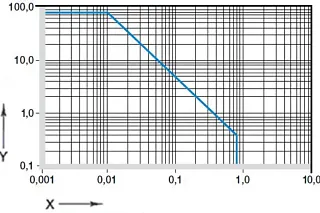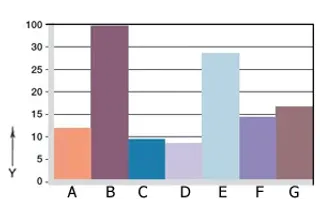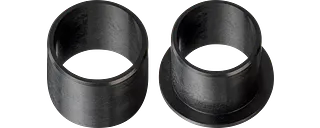Change Language :
iglidur® GLW - Material data
The most important specifications at a glance
With plain bearings made from iglidur GLW, we can offer our customers an alternative to iglidur G for high-volume production applications. Featuring similar mechanical properties as iglidur G, iglidur GLW plain bearings are primarily recommended for static loads. With regard to these applications, in which the dynamic properties of iglidur G to a large extent are unimportant, they represent a cost-effective alternative.
| Descriptive technical specifications | ||
|---|---|---|
| Wear resistance at +23°C | - 🟧 🟧 ⬜️ ⬜️ ⬜️ + | More information on wear resistance |
| Wear resistance at +90°C | - 🟧 🟧 ⬜️ ⬜️ ⬜️ + | |
| Wear resistance at +150°C | - 🟧 ⬜️ ⬜️ ⬜️ ⬜️ + | |
| Slide property | - 🟧 🟧 ⬜️ ⬜️ ⬜️ + | Coefficient of friction, dynamic against steel: 0.10-0.24µ |
| Wear resistance under water | - 🟧 ⬜️ ⬜️ ⬜️ ⬜️ + | |
| Media resistance | - 🟧 🟧 🟧 ⬜️ ⬜️ + | More information on media resistance |
| Resistant to edge pressures | - 🟧 🟧 🟧 ⬜️ ⬜️ + | |
| Resistant to shock and impact loads | - 🟧 🟧 🟧 🟧 ⬜️ + | |
| Dirt resistance | - 🟧 🟧 🟧 🟧 ⬜️ + |
Temperature
The ambient temperatures have a strong influence on the properties of plain bearings. As temperatures in the bearing system rise, bearing wear also increases. Additional protection is required at temperatures higher than +80°C.
Temperature limits for iglidur GLW:
| min. application temperature | Upper application temperature, long-term | Upper application temperature, short-term | In addition secure axially from |
|---|---|---|---|
| -40°C | +100°C | +160°C | +80°C |
Permitted speeds
iglidur GLW has been developed for low to medium surface speeds. During continuous operation, a maximum speed of 0.8m/s (rotating) or 2.5m/s (linear) is permissible. The maximum values shown in the table can only be achieved at low pressures. In practice, these values are rarely reached, due to the increasing temperatures approaching or exceeding the maximum permitted value.
Surface speeds of various iglidur materials
| Maximum surface speeds [m/s] | Rotating | Oscillating | linear |
|---|---|---|---|
| Long-term | 0.8 | 0.6 | 2.5 |
| Short-term | 1.0 | 0.7 | 3.0 |
Permissible p x v values

Diagram 01: Permitted pv values for iglidur GLW plain bearings with 1mm wall thickness in dry operation against a steel shaft, at +20°C, installed in a steel housing
X = surface speed [m/s]
Y = pressure [MPa]
Mechanical properties
The maximum recommended surface pressure is a mechanical material parameter. Conclusions about the tribology cannot be drawn from this. The compressive strength of iglidur GLW plain bearings decreases with increasing temperatures. Diagram 02 illustrates this relationship. Diagram 03 shows the elastic deformation of iglidur GLW under radial loads. Under the maximum recommended surface pressure of 70MPa and at room temperature, the deformation is less than 3%. Under this load, plastic deformation is negligible. However, this also depends on the duration of the duty cycle of the load.
Friction and wear
Like the wear resistance, the coefficient of friction μ also changes with the load and the surface speed (diagrams 04 and 05).
Coefficients of friction against steel (Ra = 1μm, 50HRC):
| iglidur GLW | dry | Greases | Oil | Water |
|---|---|---|---|---|
| Coefficient of friction µ | 0.10 - 0.24 | 0.09 | 0.04 | 0.04 |
Shaft materials

Diagram 06: Wear, rotating application with different shaft materials, p = 1MPa, v = 0.3m/s
X = shaft material
Y = wear [μm/km]
A = aluminium, hard-anodised
B = free cutting steel
C = Cf53
D = Cf53, hard-chromed
E = HR carbon steel
F = 304 SS
G = high grade steel
Friction and wear are dependent, to a large degree, on the mating partner. Shafts that are too smooth increase both the coefficient of friction and the wear of the bearing. Ground surfaces with an average surface finish Ra between 0.1 and 0.2μm are best suited (diagram 06). Diagram 06 shows an extract of the results of tests with different shaft materials that were carried out with plain bearings made of iglidur GLW. If your intended shaft material is not included in this list, please contact us.
Installation tolerances
iglidur GLW plain bearings are standard bearings for shafts with h-tolerance (recommended minimum h9). The bearings are designed for press-fit into a housing machined to a H7 tolerance. After being assembled into a nominal size housing, the inner diameter automatically adjusts to the E10 tolerances. For particular dimensions the tolerance differs depending on the wall thickness (please see product range table).
| Diameter d1 [mm] | Housing H7 [mm] | iglidur GLW plain bearing E10 [mm] | Shaft h9 [mm] |
|---|---|---|---|
| up to 3 | +0.000 +0.010 | +0.014 +0.054 | -0.025 +0.000 |
| > 3 up to 6 | +0.000 +0.012 | +0.020 +0.068 | -0.030 +0.000 |
| > 6 up to 10 | +0.000 +0.015 | +0.025 +0.083 | -0.036 +0.000 |
| > 10 up to 18 | +0.000 +0.018 | +0.032 +0.102 | -0.043 +0.000 |
| > 18 up to 30 | +0.000 +0.021 | +0.040 +0.124 | -0.052 +0.000 |
| > 30 up to 50 | +0.000 +0.025 | +0.050 +0.150 | -0.062 +0.000 |
| >50 to 80 | +0.000 +0.030 | +0.060 +0.180 | -0.074 +0.000 |
| >80 to 120 | +0.000 +0.035 | +0.072 +0.212 | -0.087 +0.00 |
| >120 to 180 | +0.000 +0.040 | +0.085 +0.245 | -0.100 +0.000 |
Moisture absorption
Chemical resistance
iglidur GLW plain bearings have good resistance to chemicals. They are resistant to most lubricants. Most weak organic and inorganic acids do not attack iglidur GLW.
All data at room temperature [+20 °C], + resistant 0 conditionally resistant - non-resistant
| Medium | Resistance |
|---|---|
| Alcohols | + up to 0 |
| Greases, oils without additives | + |
| Hydrocarbons | + |
| Fuels | + |
| Strong alkalines | 0 |
| Strong acids | - |
| Diluted alkalines | + |
| Diluted acids | 0 to - |

Buy iglidur GLW products in the online shop
- Large selection of moulds and materials
- Available within 24 hours
- No minimum order value
- No minimum order quantity
Consulting
I look forward to answering your questions

Shipping and consultation
In person:
Monday to Friday from 09:00 - 17:00
Online:
24h





